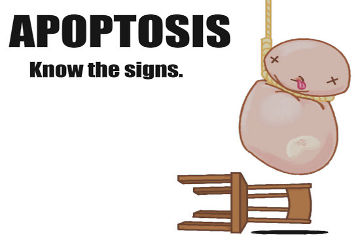What I’ve Learned:
“Apoptosis: it’s cell biology to die for!”
You might know that roughly sixty percent of your body is made of water. Slightly more if you’ve been floating in a swimming pool all day, and probably a lot less if you were double-fisting tequila shooters last night.
But perhaps you didn’t know this: you’re also made of trillions of little tiny cells, many of which behave like hysterical widows from a weepy Victorian novel. Which is to say, at the first sign of stress they throw up their subcellular hands in lamentation, beat their microscopic breasts and end it all in a suicidal cell process called apoptosis, or “programmed cell death”.
(Before we go any further, I should point out that there are two camps of scientists when it comes to the pronunciation of “apoptosis”. One group calls it “a-POP-toe-sis”, while the other (including the people who yanked the word out of ancient Greek to use it again) call it “a-po-TOE-sis”.
The first group argues that’s how the Greeks would pronounce it, and anyway, we don’t ride in “he-li-COE-tors” or on the Love Boat with “CAE-tain Stubing”. The other side says it’s a compound word and if you can’t handle a silent “p” at the beginning of “ptosis”, then you should see a psychiatrist. Or a psychologist. Or a pterodactyl. Pick your poison.
Or for fun, go tell some neckbeard scientist you have a “GIF showing apoptosis in a potato-tomato chimera”. No matter how you pronounce all that, you’ll get an argument about something.)
The actual process of apoptosis is a long chain of events kicked off by a cell; that cascade can be interrupted — if the cell finds a reason to live for, presumably, like maybe a new McRib sandwich promotion or something. But left unchecked, apoptosis means the bitter end for the cell that starts it. So why would it?
It turns out, cells apoptotically off themselves for a whole range of good reasons. Some cells are slotted to die during development — like those in the webs between our embryonic fingers and toes. Also, if a cell is damaged, malfunctioning or infected with a virus, say — better to put it out to apoptotic pasture than let it poison the other cells in the neighborhood. In all, between 50 and 70 billion cells die inside you every day, self-whacked by apoptosis.
Strangely, none of them has ever left a note. Dun-DUN-DUN!!
The nice thing about apoptosis is that it’s very tidy. None of your cells are jumping off high rises downtown or running into freeway traffic. When cells die unexpectedly, they more or less explode, exposing nearby cells to proteins and bare DNA and shattered organelles that they’ll never be able to unsee. (And more important, that could royally foul up their cellular livelihood.) The “programmed” part of “programmed cell death” gets around this; apoptotic cells essentially implode, breaking into little balls of broken-down material that can easily be cleared away. It’s cellular suicide that supplies its own body bags. Neat.
Deadly as it seems when it’s working right, the real problems with apoptosis come when it goes all wonky. If too many cells drink the Kool-Aid and try to join the mother ship, you could develop a degenerative disease that eats away your body tissue. That’s bad. On the other hand, if cells find a way to bypass apoptosis, they can grow and live forever. That’s cancer, and that’s no good either.
So you don’t want the apoptosis inside you to run too hot or too cold; it’s got to be just right. Sixty billion distraught little tragic Victorian characters a day seems about right, give or take a Bronte sister novel. Get cracking, weepypants.



